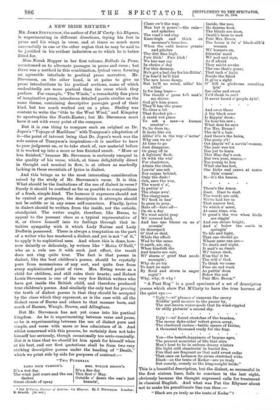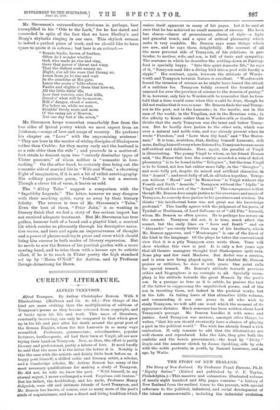MR. JOHN STEVENSON, the author of Pat M' Carty :
his Rhymes, is experimenting in different directions, trying his feet in prose and his wings in verse, and at times so much more successfully in one or the other region that he may be said to be justified in his evident indecision as to which he is better fitted for.
Miss Norah Hopper in her first volume, Ballads in Prose, accustomed us to alternate passages in prose and verse ; but there was a method in this combination, lyrical verse forming an agreeable interlude to poetical prose narrative. Mr. Stevenson, on the other hand, is at pains to give us prose introductions to his poetical sections, some of which undoubtedly are more poetical than the verse which they preface. For example, "The Winds," a remarkably fine piece of imaginative prose, introduces detailed poetic studies on the same theme, containing descriptive passages good of their kind, but too much worked out on a plan. Shelley was content to write the "Ode to the West Wind," and Kingsley to apostrophise the North-Easter; but Mr. Stevenson must have it out with every point of the compass.
But it is one thing to compare such an original as Dr. Joyce's "Voyage of Maeldune" with Tennyson's adaptation of it—the point of interest being that Dr. Joyce's work was the sole source of Tennyson's inspiration—it is another to have to pass judgment on, or to take stock of, raw material before it is worked up into a more or less finished result. "More or less finished," because Mr. Stevenson is curiously unequal in the quality of his verse, which, at times delightfully direct in thought and musical in flow, is at others as markedly lacking in these essentials of lyrics in dialect.
And this brings us to the most interesting consideration raised by the study of Mr. Stevenson's verse. It is this. What should be the limitations of the use of dialect in verse ? Surely it should be confined as far as possible to compositions of a fresh, simple kind. The humour it expresses should not be cynical or grotesque, the description it attempts should not be subtle or in any sense self-conscious. Finally, lyrics in dialect should be written from the inside, not the outside, standpoint. The writer ought, therefore, like Burns, to appeal to the peasant class as a typical representative of it, or throw himself into its feelings through that in- tuitive sympathy with it which Lady Nairne and Lady Dufferin possessed. There is always a temptation on the part of a writer who has mastered a dialect, and yet is not "of it," to apply it to sophistical uses. And where this is done, how- ever daintily or delicately, by writers like "Moira O'Neill," who as a rule use it with such just effect, the result does not ring quite true. The fact is that poems in dialect, like the best children's poems, should be crystally pure from mannerisms of any sort, and quite free from every sophisticated point of view. Mrs. Ewing wrote as a child for children, and still rules their hearts ; and Robert Louis Stevenson is one of the very few British writers who have got inside the British child, and therefore produced true children's poems. And similarly the only test for proving the truth of dialect poems is that they should be accepted by the class which they represent, as is the case with all the dialect verse of Burns and others to that manner born, and much of Barnes, Waugh, Brown, and Allingham.
But Mr. Stevenson has not yet come into his poetical kingdom. As he is experimenting between verse and prose, so he is experimenting between the use of dialect pure and simple, and verse with more or less admixture of it. And whilst concerned with this process, he certainly does not take himself too seriously, though occasionally too serio-comically. But it is time that we should let him speak for himself when at his best, and our first quotations shall be from two very striking descriptive poems under the heading of "Death," which we print side by side for purposes of contrast :—
" Two FUNERALS.
LANG DICK TADISON'S.
WS a wet day.
The wind just roars and the sea dashes Great clouds of spray
MRS. WILLIE BROOM'S.
It's a fine day This first o' May.
Ootside o' daurs the sun's just beamin'
• Pot M'Carty, Farmer of Antrim: his Rhymes. By J. Stevenson. London: E. Arnold. [es. net.]
and splashes The road's red clay Knee-high and thick on mourner's breeches.
When the ould hearse grunts
and pitches The dirt flies high.
Pair Dick! Pair Dick !
We has nae say In choice o' day For this decamp.
He's got a bad day for his flittin'.
I'm fear'd he'll find The new hoose damp, But he'll no mind, altho' his sittin'
Is for lang lease—
The thocht o' gaun to't mak's me shiver.
God gi'e him peace.
They'll has the grace
To clear a bit
That flooded pit—
A cauld wet place To ask a man—a
creatue-
To lie doon in ; It looks like sin Altho' it's in the way o' Why can we no' At time to go Just disappear,
Or gang off in
lightnin' flash.
Or with the win' For charioteer, Attain the duds, Leavin' nae ash Nor corpse behind, Only the duds ?
Och, sure the woe, The warst o' a', Is o' The shape awn'.
The clargyman Wi' book in han' Is gaun to pray,
Hats off—hats off—
On sic a day We weel micht pray Wi' covered heid, And has nae blame on us o' scornin' Or disrespeck 0' God or deid, While the effeck Wad be the same.
0 earth, air, sky, When kinsfolk die And hearts are sair, Wi' storm o' grief that needs assuagin', Why do ye try To hurt us mair By flood and storm in anger ragin' ?
Why, why, 0 why ! human natura The blinds are doon, Death's been to seek Pair Mrs. Broom.
The hoose is fu' o' weemin Wi' bonnets on, Directin' maid
Wi' nod and sign,
As if afraid They micht awake The one that's gone; That inch o' light Beside the blind It gres a sight 0' hill in gledsome sunshine lyin' Sae calm and sweet Ye'd think to see't It never heard o' people dyin'.
And ower there A big black craw Is flappin' doon; Ye hear his caw; What does he care For Mrs. Broom?
The de'il a hair.
And there's the bairn, The peety o't !
Oot playin' wi' a sarvin'-woman.
The pnir wee tot Has yet to learn This May-day's cost.
But twa year, scarce,—
Too young to ken What she has lost, She kicks and craws at soma- thin' comin'.
It—it's the hearse.
•
There's the Amen.
Dust. Dust to dust.
The words are said, We've laid her in That narrow bed, To which a' must, At some time, win.
0 great's the woe when birds are singin' And sun shines bright, And a' below the earth is springin' To life and light, That one should go
Wham mane can see—
To death and night.
It mak's us dumb Wi' terror dark, E'en tho' it be The will o' God.
To think we come Frae sic sad wark As puttin' doon Below the sod Puir Mrs. Broom."
"A Peat Bog" is a good specimen of a set of descriptive
poems which show Pat M'Carty to have the true harvest of the quiet eye :— "Ugly !—wi' plumes o' canavan the snowy Noddin' guid morrow to the passer by, The nut-brown water-pools that lie wind-rippled Or stilly picturin' a second sky.
Ugly !—wi' forest stretches of the bracken, The mossy dyke-sides' velvet green array, The clustered rashes—battle spears of fairies, A thousand thousand ready for the fray.
You—the hearth-happiness of bygone ages, The present nourisher of life that stirs Man's heat to be in unborn dreary winters His light still slumberin' in buried firs, Firs that are fragrant as that auld sweet cedar That once on Lebanon its airms stretched wide. Black—as the tents of Kedar—are ye truly But comely, comely as the king-sought bride."
This is a beautiful description, but the dialect, so successful in the first sixteen lines, fails to convince in the last eight, obviously because the thought expressed calls for treatment in classical English. And what was Pat the Rhymer about not to make his penultimate line run thus :—
" Black are ye truly as the tents of Kedar"? Mr. Stevenson's extraordinary freshness is, perhaps, best exemplified in his "Ode to the Lark," for he has dared and cucceeded in spite of the fact that we have Shelley's and
Hogg's skylarks ringing in our ears. This skylark sermon is indeed a perfect piece of work, and we should like to have space to quote it in extenso ; but here is an extract:— "Bonnie birdie, brown of feather, Often do I wonder whether God, who made ye rise and sing, Gave that power o' throat and wing, That the dullest souls amang us, Might, o'er all the woes that throng us, Learn from ye to rise and wait In the sunshine at His gate. Leave the scorn o' folks above us, Faults and slights o' them that love us, All the little bitin' ills, Loss that worries, care that kills, Dread o' what will be to-morrow, Hill o' danger, cloud o' sorrow, Far below us, while we soar, Drinkin' freely more and more 0' the sunny air o' Heaven, Not one day but a' the seven."
Mr. Stevenson keeps somewhat remarkably free from the two sides of lyrical poetry which we most expect from an Irishman,—songs of love and songs of country. He prefaces his chapter on " Love " with the unpromising sentence "They are here in the matter of wiving disciples of Shakspeare rather than Crabbe : for they marry early and the husband is as a rule older than the wife " ; and proceeds in a matter-of- fact strain to descant upon two "entirely dissimilar types of Ulster peasants," of whom neither is "romantic in love-
making." On the other hand, lie certainly does bring out the romantic side of married life in "Wife and Wean," a charming flight of imagination, if it is not a bit of veiled autobiography. His solitary patriotic poem, "Ireland," is not a success. Though a clever bit of verse, it leaves US cold.
The "Abbey Tales" suggest a comparison with the " Ingoldsby Legends." The latter, however we may disagree with their mocking spirit, carry us away by their literary felicity. The reverse is true of Mr. Stevenson's "Tales." Even the best of them, "Friar John," is so wanting in literary finish that we feel a story of fine serious import has not received adequate treatment. But Mr. Stevenson has true pathos, humour both of a broad and a playful kind, a musical lilt which carries us pleasantly through his descriptive narra- tive verses, and here and again an impressiveness of thought and a power of phrase-making in prose and verse which should bring him success in both modes of literary expression. But he needs to sow the flowers of his poetical garden with a more sparing hand, and to trim them with a keener eye to artistic effect, if he is to reach in Ulster poetry the high standard set up by "Moira O'Neill" for Antrim, and by Professor Savage-Armstrong for Down.



























































 Previous page
Previous page